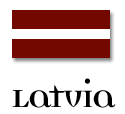Baltic states to ask EU to prioritise Sweden energy link
 Riga - The prime ministers of Baltic neighbours Latvia and Lithuania said Monday they would send a joint letter to the European Commission calling on the EU to prioritise the construction of an energy link between the Baltic states and Sweden.
Riga - The prime ministers of Baltic neighbours Latvia and Lithuania said Monday they would send a joint letter to the European Commission calling on the EU to prioritise the construction of an energy link between the Baltic states and Sweden.
"We agreed that experts must review the initiative of drafting a letter to the European Commission requesting that the connection between the Baltic countries and Sweden be included among the priority projects to be funded by the European Union," Latvian Prime Minister Ivars Godmanis said after meeting his Lithuanian counterpart Andrius Kubilius.
Both Latvia and Lithuania are known to want a link to Sweden to help the Baltic states escape their current status as an "energy island" in the European Union.
Currently, a cable from Estonia to Finland called Estlink is the only major connection joining the Baltics to the Nordic grid.
The electricity systems bequeathed to the Baltics by the 50 years of Soviet occupation which ended in 1991 have hindered attempts at full energy integration.
"We talked about connections between the Baltic countries and Sweden as well as between Poland and Lithuania. We also talked about the Estlink connection and the integration of our energy systems with the Scandinavian and European sytems," Godmanis said.
When asked if the proposed Swedish link would connect to Latvia or Lithuania, the two leaders laughed and said a decision would be made "very soon."
Lithuanian leader Kubilius said: "We are ready to finance an interconnection to the Baltic market from Sweden."
Godmanis told Deutsche Presse-Agentur dpa the letter to the European Commission was currently being drafted but gave no precise date as to when it would be sent.
Other topics discussed included economic issues, cost cutting and the plans both countries have for the stabilisation of the financial situation as well as their respective reactions to rioting that occured recently in both Riga and the Lithuanian capital, Vilnius.
Kubilius rejected the suggestion that the unrest in Vilnius had been caused by tax rises introduced by his recently-installed government, laying the blame at the effects of the worldwide recession.
Furthermore, the January 16 riots could be seen as evidence that "Lithuania is becoming a regular European country," Kubilius argued.
Kubilius was due to continue his Baltic tour in Estonia on Monday night and Tuesday. (dpa)